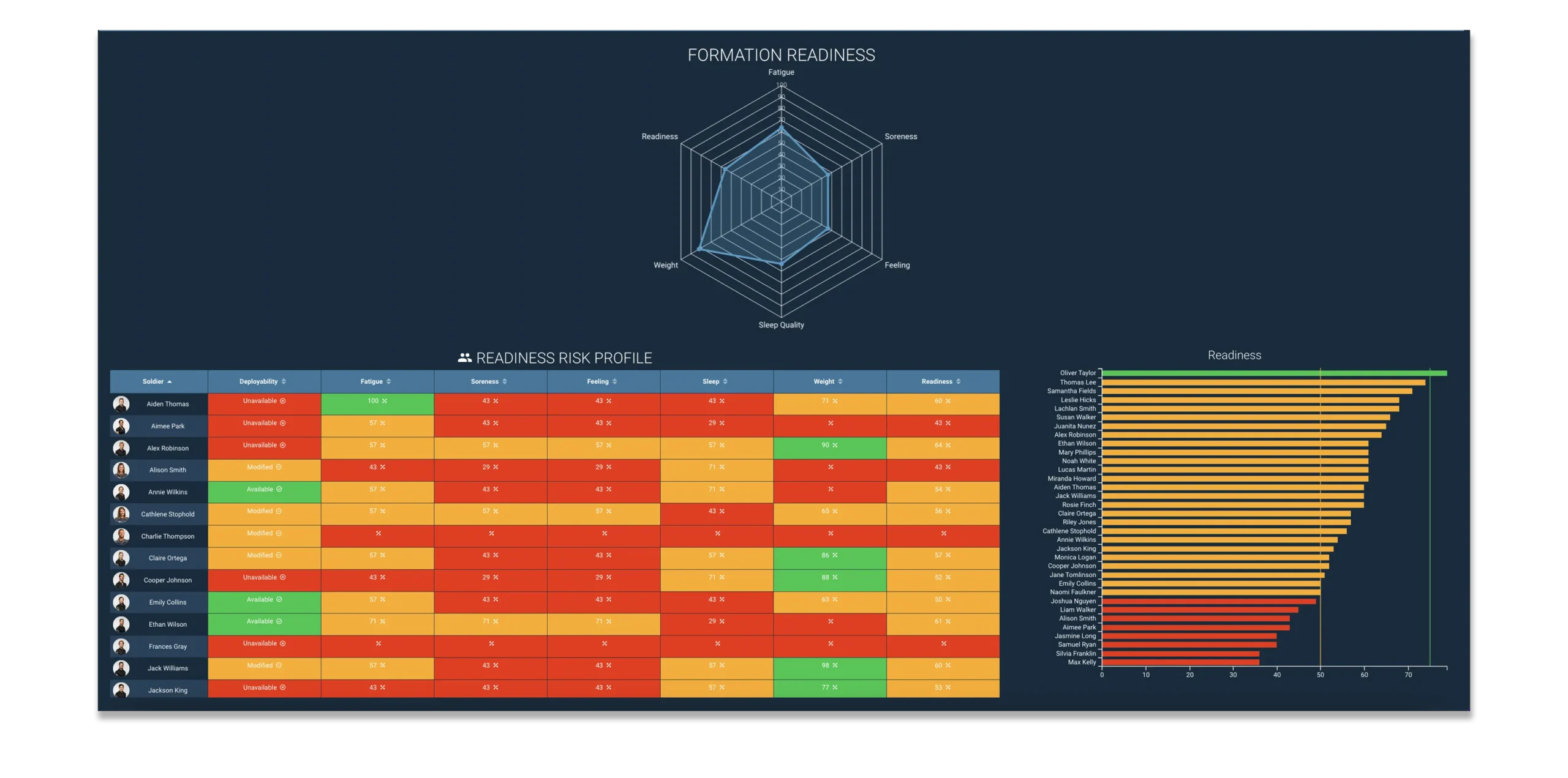By Joe Cruz, 2F Program Director 1/1 ABCT, 1st Armored Division
This is the second article in our three-part series on How to Operationalize an H2F Program. Click here to catch up on Part 1 Initiating Change. A huge THANKS to Joe Cruz for sharing his experience and wisdom. We hope you find this series helpful and stay tuned for Part 3 Beyond Physical Readiness.
Making Data Valuable and Useful in Decision-Making
Technology is the third way that were operationalizing H2F effectively and magnifying the impact of our staff. With the right human performance optimization platform, we can maximize the impact of H2F across a 4,500-person brigade. We were able to leverage a Human Performance Data Management System (Smartabase) through an Army program that allows us to capture data in a timely and effective manner and package it in a palatable form that commanders can easily digest. You can gather a lot of human performance information, but what matters is how it informs your program and facilitates timely and effective decision-making.
Whether information is valuable and useful to a commander or not doesnt just depend on whats being presented to them, but also on when they receive it. When I was a troop commander, I learned the acronym LTIOV, which stands for Latest Time Information is of Value. If a leader gets information too late, its useless because they will have already made a critical decision with missing pieces and an incomplete picture. Whereas if you can put more complete data thats easy to interpret in your commanders hands quickly when theres a risk, you help them mitigate or eliminate it.
This is critical to the success or failure of a mission and could be the difference between soldiers living or dying.
Smartabase eliminates the delay between the point when information is collected and aggregated and when we can share it with commanders, allowing us to communicate data that is both applicable and timely to enhance their decision-making ability. It helps us stay within the timeframe when information is at its most valuable and useful to our leaders.

Improving Care Through Soldier Surveillance
A major aim of the H2F initiative is to provide soldiers with the same level of care and service that special operators have received for years. To do this at scale and yet on a personalized level, we needed a way to create genuine and meaningful engagement through a widespread and proactive surveillance program.
Genuine engagement is I truly want to do this, and meaningful engagement means you understand why you want to do it and it’s producing the outcome that you want. Were trying to achieve both by conducting and following up on our AM wellness check, which has provided the kind of feedback loop we never would have created otherwise.
Every Monday and Friday, soldiers use the Smartabase app to fill out a seven-question survey that covers their stress level, sleep quality, connection to a higher power, and other questions relating back to the H2F domains. Their answers have red flag criteria if someone has an issue, the H2F domain leaders get an alert so they can follow up and have an informed conversation. The more consistent we are with providing this kind of engagement and intervention for someone who says, I have a problem, the more effective the self-reporting concept will be. Deliberate data collection and management also enables us to inform programming and direct H2F resources to the individuals who need them the most.
Looping Leaders into a Failsafe Follow-Up Process
When a soldier reports an issue, we want first line leaders to have the Smartabase app on their phones and be included in the reporting chain. Were working toward creating a failsafe mechanism, so if theres an initial notification about an individual and nobody follows up on it, a second alert is sent via Smartabase to ensure theres an intervention. That way, no one who needs help falls through the cracks, and weve leveraged technology to empower leaders to be more engaged with their soldiers.
Bringing leaders into the reporting loop through the Smartabase app on their phones makes them more mobile. Too many of our officers are tied behind the computer and you can’t develop meaningful relationships that way.
The Smartabase app allows them to be more connected when theyre on the go, so while theyre moving through the formation conducting battlefield circulation, the Smartabase app is on their phone. If their phone pings to inform them of a problem like a soldier reporting that theyre too stressed out, they can take a detour and change their plans. They could call a sergeant, let them know that theres an issue in their company, and have them check in with the soldier to see whats going on. It may be as simple as an individual having poor coping skills and being unable to deal with a minor stressor, or as serious as someone having suicidal thoughts. Either way, leaders are more aware of whats going on in their battalion and can be involved in sorting out any situation that compromises a soldiers health.
Read the Full Series: How to Operationalize an H2F Program
We hope you found some inspiration and tips in this series on operationalizing an H2F program, authored by Joe Cruz, 2F Program Director 1/1 ABCT, 1st Armored Division. Below are links to read the full series.
